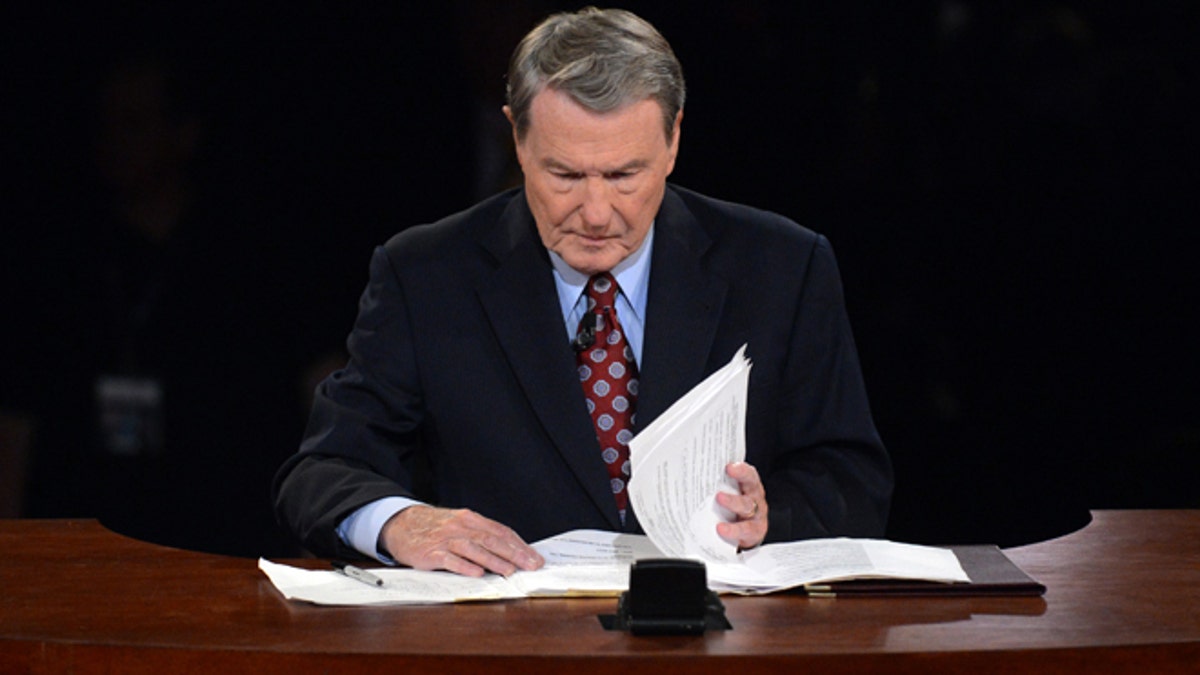
Oct. 3, 2012: Moderator Jim Lehrer looks over his notes before the first presidential debate. (AP/EPA Pool)
Debate moderator Jim Lehrer framed most of his debate questions Wednesday night to draw out and make clearer the policy differences between President Obama and Mitt Romney.
Lehrer, of PBS, might have theorized that highlighting the differences and letting the candidates explain them in their own words would help voters make more-informed choices on November 6.
If that was the goal, the approach worked fine. It forced the candidates out on the major domestic issues of contention in this 2012 campaign – jobs, taxes, entitlements, deficits, health care, the role of government and the art of governing. And it produced some spirited, pointed and revealing exchanges.
On paper, such loose structuring of the questions – or lack of structuring -- would appear to favor Obama, who going in was viewed by the media cognoscenti as the more-polished and articulate speaker, the more-knowledgeable-and-confident executive, the quicker-on-his-feet thinker and the more-likable person.
And Obama handlers might have figured that a debate in which the questions are free-form instead of specific should be a slam-dunk for the president.
They figured wrong.
Instead, they gave Romney a chance to show his articulate and knowledgeable sides because the open-ended questions allowed him to repeatedly put Obama on the spot by challenging his four-year record, sharply criticizing his plans and programs and contrasting them with his own proposals.
Where Lehrer refrained from challenging the president’s record, Romney jumped into the breach and forced Obama off his game, which seemed to be to run out the clock and get back on the campaign trail, where he seems more comfortable.
Normally, when a debate is held between a sitting president and a challenger seeking to unseat him, the moderators’ questions often force the incumbent to defend his stewardship over the past four years.
For example, in the first 2004 debate between incumbent President George W. Bush and Democratic challenger Sen. John Kerry, Bush was repeatedly pushed onto the defensive by questions asked by the moderator, who again was Lehrer.
Lehrer asked Kerry, “Do you believe you could do a better job than President Bush in preventing another 9/11-type terrorist attack on the United States?”
He later asked Bush, “Has the war in Iraq been worth the cost of American lives, 1,052 as of today?”
And at another point Lehrer asked Kerry, “You've repeatedly accused President Bush…..of not telling the truth about Iraq, essentially of lying to the American people about Iraq. Give us some examples of what you consider to be his not telling the truth.”
We heard no such tough questions from Lehrer Wednesday night about Obama’s management of the economy, the effectiveness of his $787 billion stimulus plan or the fact that unemployment has been above 8 percent for nearly four years.
Instead, we got questions such as these:
• “What are the major differences between the two of you about how you would go about creating new jobs?
• “What are the differences between the two of you as to how you would go about tackling the deficit problem in this country?”
• “Mr. President. Do you see a major difference between the two of you on Social Security?”
In news reporter parlance, such questions are considered “softballs” -- tailor made to allow an incumbent president to avoid his record and sail into the talking points he has repeated many times before.
If that was the strategy behind the questions, it backfired. By most accounts, Romney came out the winner. Obama seemed off balance. And Lehrer got credit for -- accidentally or intentionally -- producing a pretty good debate.
